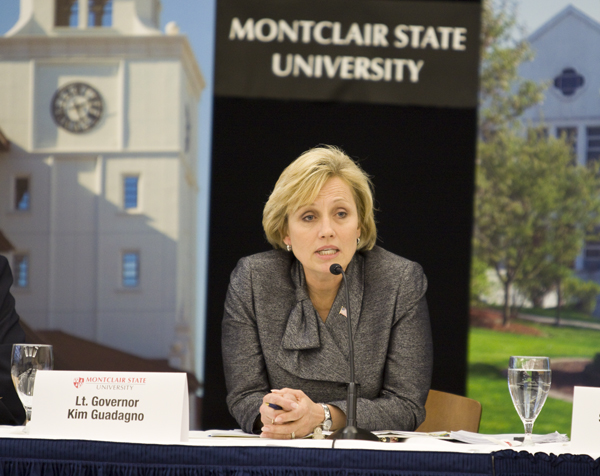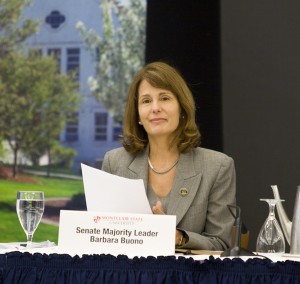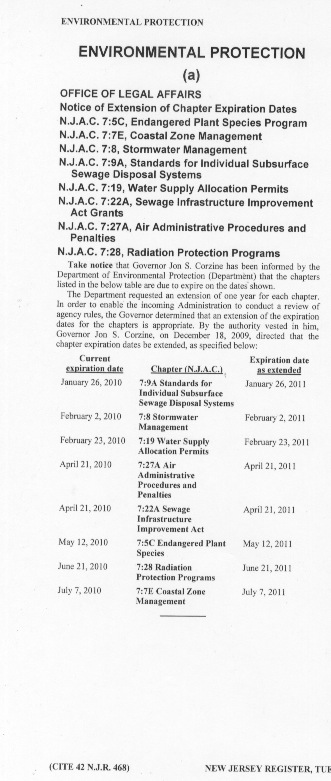
Lt. Governor Guadagno (Regulatory Czar) Chairs the Red Tape Review Group
[Update 2 Bergen Record coverage: “Red Tape Committee hears gripes”
Several environmentalists urged the board to consider the impact of removing regulations that protect the environment and public health.
Bill Wolfe, director of Public Employees for Environmental Responsibility, said a rule that was frozen in the moratorium and later further delayed by the DEP was designed to reduce the amount of the chemical perchlorate in public water supplies.
[Update 1 below – passing the straight face test]
I hardly know where to begin, other than to say that after seeing it in action, that the “Red Tape Review” process is actually worse than I had imagined.
Never mind the duty to protect environment, there was absolutely no recognition that even the public interest was at stake – the hearing was purely a forum to allow private corporations to vent grievances and seek relief from various government regulatory oversight requirements (which were demonized as “red tape”).
From a news standpoint, the breaking news is that DEP Commissioner Bob Martin announced a new DEP Assistant Commissioner for Economic Development. Not only is this in conflict with DEP’s statutory mission to protect the environment, it is telling of the character and courage of the man that Martin announced it after his Senate confirmation and 2 media interviews. The man is not to be trusted.
Also newsworthy, was the huge embarrassment that the sledgehammer Christie Moratorium caused the DEP’s CAFRA Traffic Rule to expire, which may have killed the financing for a hotel development in Wildwood. Ironically, the traffic rule was proposed to alleviate parking requirements and provide a compromise solution to meet the developers needs. Martin denied any knowledge of the situation, but the developer was angry that he was assured that the rule would be adopted. (see Update below for details)
There was little recognition of the role of science in decisions and as the basis for rules (it was all politics and economics); no deference to the rule of law (i.e. regulations have the force and effect of law and can not be violated by private political agreements); little discipline, in terms of subjecting claims to factual support; and no sense that the access promised to corporate players was both unseemly and not transparent. And there was little humility by the (former County Sheriff) Lt. Governor, which is something one would expect given her paucity of knowledge or experience on Trenton regulatory matters.
Not only was there no humility, there was arrogance and posturing, as the Lt. Governor attacked absurd bureaucratic red tape she had found herself, as she sympathized with several business lobbyists in their quest for relief from the bureaucracy in Trenton. (Why do Republicans who so hate government want to lead it?)
At the outset, Guadagno asked speakers to honor a 5 minute rule. A huge clock was there to remind. But just one speaker spoke for less that 7- 8 minutes, with several going from 10-12 minutes. Things were flexible. Only one or two had to be asked courteously to sum up after 8 or so minutes.
But, when I tried to testify (as 1 of only 2 public interests advocates amongst the corporate lobbyist hordes) about the specific 12 DEP rules frozen by EO #1 and why the “Common sense” principles of EO #2 didn’t make sense from an economic or environmental standpoint, my testimony was cutoff rather abruptly and rudely by Guadagno at exactly 5 minutes, 12 seconds. Contrary to decorum, I was not given the opportunity to sum up but was simply told to stop speaking.
Maybe that’s because I said that I felt like I was in the Twilight Zone – in that the focus of the conversation (i.e. on purported regulatory impediments to economic development) was so divorced from the real causes of the economic recession. And the prescriptions – more deregulation – were completely absurd in light of the fact that lax regulatory oversight and deregulation policies had directly led to the financial collapse that caused the economic recession we’re in. Only a fool would ask for more, right?
So much for informed democratic dialogue and tolerance for differing views.
I couldn’t stomach Dave Pringle’s continuing apologetics and the corporate onslaught, and had to leave after 3 hours (sorry for missing the testimony of my colleague Grace Sica of NJ Sierra Club, the only other public interest advocate to testify).

Senate Majority Leader Barbara Buono
Still watching and waiting for the Democrats to stand up to this juggernaut – Senator Barbara Buono kept her powder dry while I was there, with the exception of taking on a hospital spokesperson who opposed health statistics reporting requirements created by a bill she sponsored.
[Update: passing the straight face test:
1. Is there one credible economist who claims that regulatory burdens have caused or contributed to the economic recession we are in? Then how can reducing regulatory burdens stimulate economic growth?
2. There are thousands of DEP permits and approvals for projects that have not been built. To avoid expiration of those permits, the Legislature passed the Permit Extension Act (twice). So what economic growth benefits could possibly result from “streamlining” and “expediting” DEP permits and reducing DEP regulatory burdens?
3. Data show that DEP approves 99% of permits. How much more certain and predictable can DEP get? Given this data, how can any industry lobbyist complain that lack of certainty and predictability at DEP is what drives economic investment out of NJ to other states?
Failing the straight face test: (Star Ledger: 3/2/10)
Environmental activists said they feared the meetings would be an excuse for the governor to loosen protections for vulnerable ecosystems.
But Guadagno said that would not be the case — they were not reducing the type of regulations, but rather how they’re carried out.
“It’s in everyone’s best interest to make sure the environment in New Jersey is protected,” she said. “Let’s just do it in an efficient way. If people are not going to get a permit, tell them. Don’t send them from agency to agency to agency.”
 Failing the straight face test #2:
Failing the straight face test #2:
Developers of a hotel in Wildwood railed against DEP allowing a proposed rule that would provide relief from CAFRA parking requirements to expire. DEP Commissioner Bob Martin claimed he knew nothing about it. But, there was a clear transition plan between Christie and Corzine regarding DEP rules in the pipeline. Here is the plan:
a) The Corzine DEP adopted 4 rules. See this:
b) Governor Corzine extended 8 key rules scheduled to expire in early 2010. According to a notice in the January 19, 2010 NJ Register: (42 NJR 468):
“In order to enable the incoming administration to conduct a review of agency rules, the Governor determined that an extension of the expiration dates for the chapters is appropriate. By the authority vested in him, Governor Jon S. Corzine on December 18, 2009 directed that the chapter expiration dates be extended, as specified below (see right hand column):
c) On January 20, 2010 Governor Christie issued Executive Order No. 1 which froze 12 DEP rules in the pipeline. See this. Since then, 1 was killed (perchlorate drinking water standard).
So if Bob Martin didn’t know about the CAFRA parking rule, he certainly should have. If he didn’t, who else was in charge of DEP Transition???

Pingback: WolfeNotes.com » “Onerous Regulations” Had Nothing to Do with This Plant Closure
Pingback: WolfeNotes.com » DEP Commissioner Martin Called to Testify Tomorrow
Pingback: WolfeNotes.com » Christie “Red Tape” Rollback Bills Re-Emerge – Backed by Democratic Legislators
Pingback: WolfeNotes.com » Year of Rollback, Retreat, and Appeasement – Christie Worse Than Whitman 1994
Pingback: WolfeNotes.com » “Reporting” on Lt. Gov. Guadagno’s “image” and “hurt feelings”
Pingback: WolfeNotes.com » DEP Plans To Expand Beach Access – for Builders
Pingback: WolfeNotes.com » Christie Regulatory Czar Consolidates Power